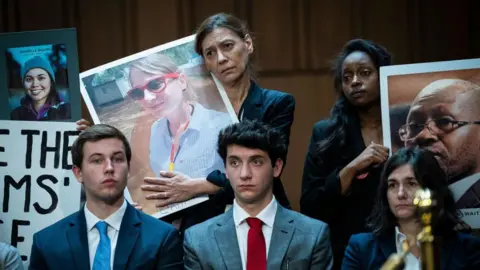In a significant turn of events, U.S. prosecutors are contemplating the prospect of dropping a criminal fraud charge against Boeing, a leading player in the aerospace industry, which is linked to two catastrophic incidents involving its 737 Max aircraft. These incidents, which occurred in late 2018 and early 2019, claimed a total of 346 lives and led to widespread scrutiny of both the aircraft’s safety and Boeing’s corporate practices.
In a recent online meeting held with relatives of the victims associated with these tragic crashes, representatives from the Department of Justice (DOJ) indicated that they might allow Boeing to enter a non-prosecution agreement. This route would enable the company to settle the charges without facing a trial set to begin in June, following a judge’s rejection of a previous settlement where Boeing had agreed to plead guilty to the charges. Such a settlement had initially included a financial penalty and commitments toward improving safety compliance.
However, this potential decision has not been received well among the families of the victims. Lawyers representing those who lost loved ones in the crashes expressed profound disappointment with the DOJ’s recent discussions. Erin Applebaum, a partner at the law firm Kreindler and Kreindler, which advocates for 34 families of Ethiopian crash victims, voiced concerns over the DOJ’s handling of the case. She stated that while the DOJ claimed that no final decision had been reached, the manner in which the meeting was presented suggested that the outcome had already been effectively determined. Applebaum contended, “Boeing has never stood trial for the 346 lives lost due to its admitted crimes. Now, DOJ is prepared to let the company walk away, again, with no more than a financial penalty.”
Boeing currently faces a serious charge of criminal fraud conspiracy, which emerged in the aftermath of two devastating accidents involving the 737 Max jets. The crashes were attributed to flaws in a piece of flight control software that were not adequately communicated to the pilots or the regulatory authorities. Following these events, the DOJ accused Boeing of intentionally withholding critical information from regulators, leading to the fraud charge against the company.
Previously, Boeing had reached a settlement with prosecutors where it admitted to the wrongful conduct while paying $2.5 billion in fines and compensation. The settlement included commitments to enhance safety standards and compliance programs. The case saw renewed scrutiny last year when an incident involving an unused door detached from a 737 Max mid-flight, revealing potential breaches of the original agreement with the DOJ. Consequently, a new agreement was struck that mandated Boeing to plead guilty to the fraud charge, pay an additional fine of $243 million, and accept oversight from a court-appointed monitor for a designated period.
Nonetheless, this agreement faced a setback in December when U.S. District Court Judge rejected it, raising specific concerns regarding the selection process of the appointed monitor. Following this, Boeing reportedly sought to withdraw its guilty plea.
If the criminal charge were to be dropped in favor of a non-prosecution agreement, the company’s legal strategy would be significantly eased, as it would bypass an official admission of criminal activity. This outcome would prevent Boeing from acquiring a criminal record—a scenario that could complicate its operational relationships as a contractor for the federal government.
As it stands, the case is still slated for trial on June 23, an event that may now hinge on whether this proposed non-prosecution agreement is allowed to come into effect. The implications of such a decision remain profound, not just for Boeing but also for the families searching for justice regarding the loss of their loved ones in the tragic accidents—a pursuit they feel has been insufficiently addressed by the DOJ. The ongoing developments underscore the fragility of corporate accountability in the face of tragic outcomes, raising questions about the integrity of regulatory practices within the aviation industry.



